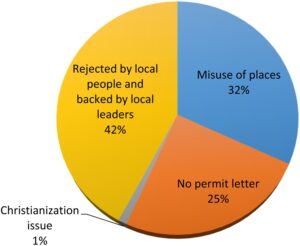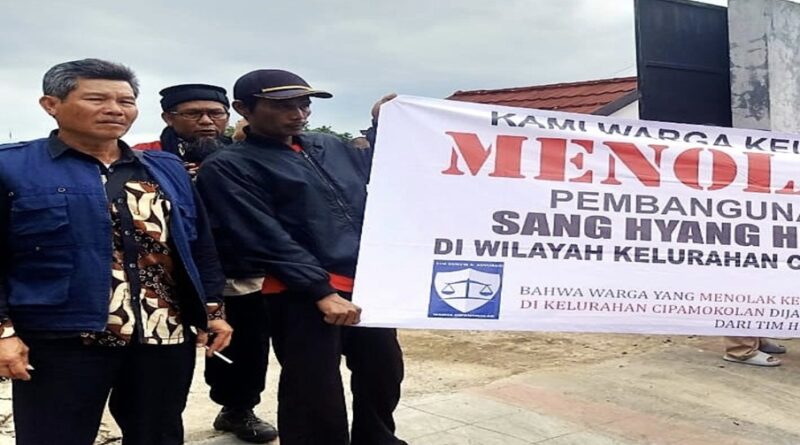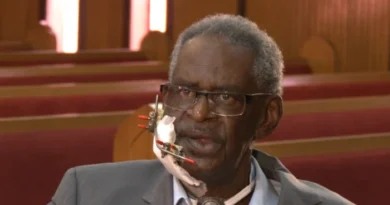Indonesian Church Opposed by Muslims on New church Site
A Christian church in Indonesia’s South Sulawesi Province has recently faced unexpected opposition to its plans for constructing a larger worship facility, despite worshipping peacefully in the area for two years. The Toraja Christian Church of Lanraki, located in Paccerakkang village, Biringkanaya Sub-District, has been gathering in a modest home without prior objections from the community. However, on February 4, 2025, resistance emerged against the church’s construction, raising concerns about religious intolerance and Christian persecution in Indonesia.
The church, having grown in congregation size, applied for a construction permit in May 2024 to accommodate its members. Initially, the application process went smoothly, with local residents even supporting the plans under the condition that streetlights be installed on a 300-metre stretch leading to the site, a request the church fulfilled. However, opposition surfaced unexpectedly when a banner appeared in the nearby Makasar City Police Housing Complex, stating that local Muslim residents rejected the construction of the church and any Christian religious activities in the area. The source of the banner remains unknown, and local residents who were not involved in its installation reportedly removed it the same day.
Local authorities, including Biringkanaya Sub-District head Juliaman, condemned the act, citing Indonesia’s constitutional guarantee of religious freedom. Ian Hidayat of the Indonesian Legal Aid Foundation labelled the banner as hate speech, warning that such actions could incite inter-religious tensions. The Interfaith Cooperation Forum (FKUB), an interreligious advisory body, visited the church site and expressed surprise at the opposition, as the land was vacant and far from residential areas apart from a police dormitory.
To address the situation, FKUB officials promised further mediation between the church and any opposing parties. Meanwhile, Pastor Nicky Wakkary, who was previously prevented from holding a Christmas service in Cibinong, West Java, encouraged the congregation to remain strong in their faith and foster better relationships with the local community and government.
While Indonesia is known for its religious diversity, Christians continue to face significant challenges, particularly in regions where conservative Islamic influence is strong. Although the Indonesian constitution upholds religious freedom, incidents of church closures, permit rejections, and intimidation have persisted.
According to the Setara Institute for Democracy and Peace, cases of intolerance and violations of religious freedom often go unaddressed by the authorities. Hendardi, the chairperson of the institute, noted that the current administration under President Prabowo Subianto, who took office in October 2024, has not prioritised tackling these issues.
See Also: 10 cooking and eating habits that can lead to cancer
Indonesia’s Christian population, which makes up approximately 11.43% of the country’s 270 million people, often faces systemic barriers when establishing places of worship. Evangelical Christians, who account for about 3.23% of the population, are particularly vulnerable to opposition due to their active outreach efforts. Islamic extremist groups have been known to target churches, making evangelism a risky endeavour.
Indonesia ranks as one of the countries where Christians experience persecution, according to Open Doors’ 2024 World Watch List. Persecution manifests in various forms, including legal restrictions on church permits, violent attacks, and social discrimination.
The Indonesian government requires religious groups to obtain a significant number of signatures from the local Muslim-majority population before approving church permits. This regulation often results in churches being unable to obtain necessary approvals, leading to closures or worship services being held in secret.

Several churches have been targeted by extremist groups. In recent years, there have been multiple bombings and attacks on Christian places of worship. For instance, in 2021, a suicide bombing at a Catholic church in Makassar injured 20 people. Such incidents create a climate of fear for Christian communities across the country.
Christians in predominantly Muslim communities often face social ostracisation. In some regions, Christian students experience discrimination in schools, and Christian-owned businesses face boycotts. In more extreme cases, Christians have been forcibly evicted from their villages.
The situation in Paccerakkang village is a reminder that while Indonesia is constitutionally secular, religious intolerance still exists in practice. Government intervention is crucial to ensuring that religious freedom is upheld. Stronger enforcement of constitutional rights, protection against extremist threats, and fair implementation of religious building permits are necessary to foster a more inclusive society.
Interfaith dialogue, as promoted by groups like FKUB, also plays a vital role in reducing tensions. Religious leaders and community representatives must work together to promote understanding and mutual respect.
The recent opposition to the Toraja Christian Church’s construction highlights the broader issue of Christian persecution in Indonesia. While the country prides itself on religious tolerance, Christians continue to face restrictions and opposition, particularly in regions where conservative Islamic influence is strong. Addressing these issues requires government commitment, stronger legal protections, and continued advocacy from religious freedom organisations. Only through these efforts can Indonesia truly uphold its constitutional promise of religious freedom for all its citizens.
Content Credit| This article was orginally posted by https://www.christiandaily.com/
Picture Credit | https://mychristiandaily.com/




